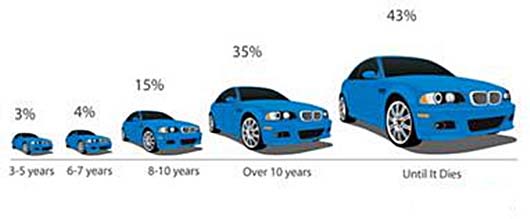

As a car enthusiast for all of my life, someone who has owned and restored old cars, and has a son-in-law named Ryan who owns a Land Rover Dealership - I know a bit about them.
How long to keep your car depends on the car, your needs, finances, bought or leased, where the car is kept (indoors or out), and how you maintain your vehicle. There are so many factors involved in keeping an old car that it is hard to guide that decision. I do believe that if repairs costs are too high - get rid of it - and be sure you trust your mechanic. Further - be careful who else drives your car - especially their maturity level and emotional state. If you plan to keep your car and they wreck it - you're in trouble personally and legally.
In 2012 with the economy in trouble, people are keeping their cars much longer - especially as they are built to last. When i first stated driving in the 1960's - a car was considered old after 50,000 miles. Most people traded in their cars after 3 years. Today - depending on the make and model - a decently cared-for vehicle should still be running long after the odometer has clocked 100,000 miles. Keep driving it and you save money not only because you don't have to make payments on a new car, but also because insurance premiums are lower, and in some states, so are registration fees and personal-property taxes.
Further ... things that are not built into your car can be purchased separately such as a GPS phone app. Try WAZE
Why you should keep your clunker CNN - August 10, 2012
Americans are holding on to their old cars, both because of financial pressures and because 150,000 miles is a reasonable expectation. Want another factor? Automakers aren't changing styling every year.
I have vivid memories of '50s and '60s dads who bought a new car every year. And I remember groups of them standing around at the neighborhood barbecue, wearing hats and jingling the change in their pockets, as they talked about being diehard Ford, Chevy or Chrysler men. "I wouldn't drive a Ford if you gave me one," the GM guy would say.
"Oh yeah?" the Ford guy would reply, "I wouldn't use my Ford to drive your Chevy to the dump." And for good measure, he'd shoot back this joke: "How is a golf ball different from a Chevy? You can drive a golf ball 200 yards." (And oh yes, the Chevy guy's response is, "How do you double the value of a Ford? You put gas in it.") And both of these guys would have brand-new cars out front.
Times have changed, and it's affecting new car sales. For one thing, automakers don't automatically update their styling every year, as they did back in the day. The '59 Chevy was radically different from the '60. And if the neighbors can't tell you have a new car, what's the point?
A new survey by AutoMD.com finds other reasons - cars are better built and last longer today (whatever happened to rust?) and people are finding it cheaper to repair and maintain the old clunker than buying new. Eight of 10 car owners are keeping their cars at least a decade. Look at that loyal GM man at right. He's happy, why does he need a new car? A whopping 44 percent in the site's survey said they're going to keep driving their bomb, and put up with more regular repairs and parts buying, "until the undertaker delivers a tombstone." And 47 percent said they would just rather not buy a new car now. That's the recession talking.
The parts business is booming. According to eBay Motors' mobile app, somebody buys a wheel or tire on an app every 14 seconds, and an engine or component every 25. Ironically, parts aren't much of an issue with electric cars, whose motors are practically sealed for life. EVs are still a tiny part of the market, though, so nobody's really worried yet.
A Black Book survey finds that most people want to see 125,000 to 150,000 on their odometers before they consider a trade-in, and that makes sense because modern cars can easily go that distance without major repairs.
Perhaps Detroit would be doing better if it had hung on to planned obsolescence. But despite the economy the auto industry isn't exactly dying at the moment. If current trends continue, 14 million cars and trucks will be sold to Americans in 2012, which is 13 percent growth from 2011. According to Edmunds.com Chief Economist Dr. Lacey Plache, "The bottom line is that pent-up demand for autos is still strong and can be expected to continue to contribute sales, given the aging fleet and the current expansion of credit."
Ah yes, the "aging fleet." A lot of people own really old cars now, and that's sending them - reluctantly - into the auto markets. And because people are having a better quality experience with American cars, they're more likely to buy domestic this time around. See, quality pays off, and it all works out in the end.
So if you do intend to keep that old rattletrap forever, you'll need a good maintenance schedule - check out these useful tips. Cars with 100,000-plus miles need special care. Here's some sage advice for venerable vehicles: